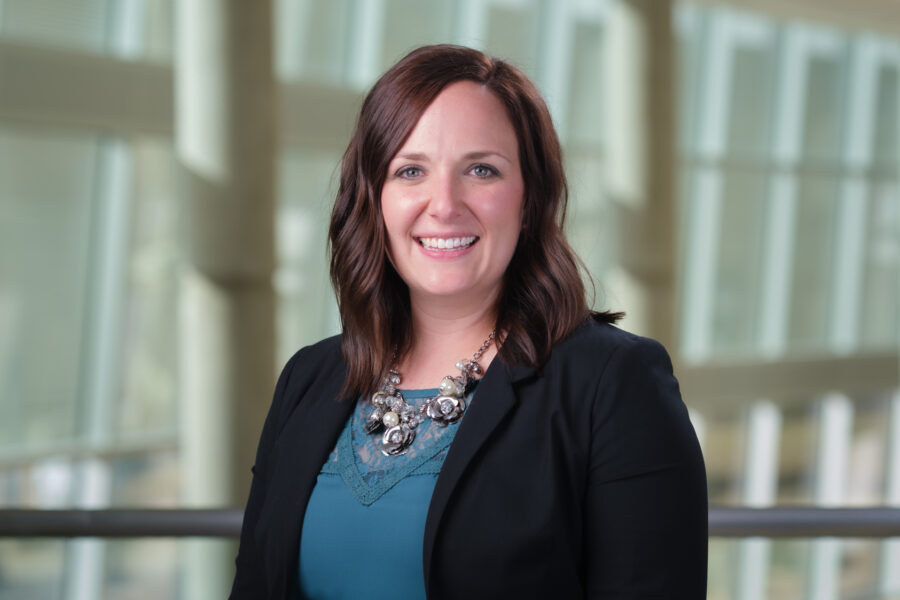A digital platform years in the making, created through a collaboration between the UNMC College of Nursing, UNeMed, UNeTech and Nebraska Medicine, will position UNMC at the forefront of health care innovation, its creators said.
Familyroom.health now is scaling nationally to support families during critical care crises.
Twelve years ago, Breanna Hetland, PhD, then a critical care nurse, sat at her father’s ICU bedside and realized something: Despite all her clinical training, she felt helpless as a patient’s family member.
“The system I had worked in for years suddenly felt foreign when I was on the family side of the hospital bed,” said Dr. Hetland, associate professor in the UNMC College of Nursing and the nurse-researcher who developed Familyroom.health. “That experience showed me that we’ve been missing an entire half of the healing equation. We focus intensely on the patient but leave families to just figure it out.”
That insight led to years of NIH-funded research for Dr. Hetland, but the transformation from research to commercial application came in 2023, when she partnered with product strategist Greg Nelson. Nelson’s background in innovation and human-centered design proved instrumental in evolving Familyroom.health from a research endeavor into a scalable commercial solution poised to change the industry paradigm for family engagement.
“Familyroom.health is a clinically validated digital platform that transforms overwhelmed family caregivers into confident care partners,” Dr. Hetland said. “It’s the first platform of its kind to allow families to chart their contributions directly in the electronic health record, making family input a documented part of patient care.”
The program provides evidence-based tools, resources and peer guidance to address the gap in family engagement during critical care. Drawing from Dr. Hetland’s work as an implementation scientist and Nelson’s human-centered design experience, the platform is designed to ensure sustainable adoption within complex health care systems.
The project has secured more than $1 million in funding, and the platform continues to be refined through clinical trials at Nebraska Medicine, even while signing pilot partnerships with other major health systems.
“This demonstrates both strong external validation of UNMC research and immediate commercial viability in the national health care market,” Dr. Hetland said.
She pointed to the need for Familyroom.health.
“Six million Americans face critical illness in ICUs annually, affecting 15-20 million family members who suddenly become caregivers,” she said. “These families are thrust into overwhelming situations without preparation, often shocked, confused and feeling helpless.”
In creating the platform, which provides information to family members on what to expect, ask, and do when faced with the ICU hospitalization of a loved one, researchers drew input from many local ICU nurses, families and health care leaders.
“We essentially sat families down and interviewed them,” Dr. Hetland said. “The platform offers tips that are infused with those family stories, as well as input directly from nurses. So we’re able to say it’s been co-created, bringing together both perspectives.”
The platform features an adaptive assessment engine upon first sign in, with questions designed to pinpoint where users are in their ICU journey.
“’Have you been in this situation before? What level of support do you have at home? How are you feeling emotionally?’” Dr. Hetland said. “Based on those responses, we have an algorithm that then provides tips that are most pertinent to the part of the journey they’re at and their emotional state.”
She gave an example: On the first day for a family that has never been in the ICU before, the platform might suggest personalizing the room, including the type of photos to display and items the family and patient may want to have on hand.
“The current iteration of the platform was run through task-driven simulations that were sponsored by the NIH in 2024,” Dr. Hetland said. “We actually brought ICU family members and Nebraska Medicine nurses over to the simulation lab, gave them the product and had them run through scenarios. So this version is informed by people who’d had an ICU experience.”
The team will continue to track the experience of people who use the platform, in order to refine and enhance it.
